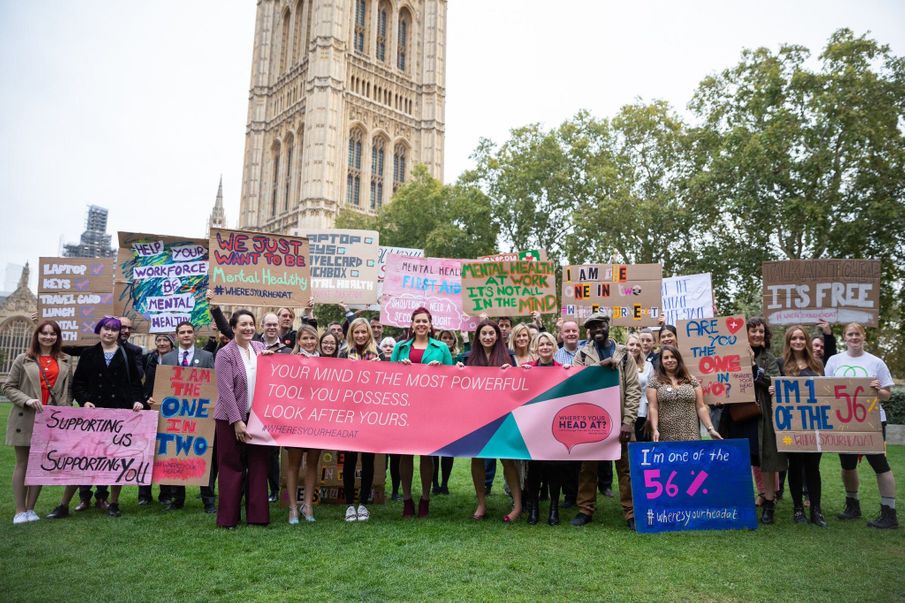17th January marked a special milestone in the movement for workplace mental health support - parliamentary debate and backing to a change in the law
A much-awaited debate on mental health first aid in the workplace was held in the House of Commons, on 17th January, with a view to changing first aid legislature.
Luciana Berger MP opened the proceedings and her argument was clear and simple. The 1974 Health and Safety Act ensures that every large workplace has someone trained in medical first aid - an accepted and established part of every workplace in the UK. So, why is this not also the case for trained mental health first aiders?
Berger called for a change to the Health and Safety Act, so that an employer’s responsibility explicitly covers the mental health, as well as the physical health, of their employees. She noted: “This would be a simple shift but one with such a huge, beneficial impact on the lives of millions of British workers.”
This afternoon, I led the #WheresYourHeadAt debate with @normanlamb & @JohnnyMercerUK, calling on the government to change the law to ensure mental health first aid training in the workplace >>> pic.twitter.com/LsDRxTUndN
— Luciana Berger (@lucianaberger) January 17, 2019
“I don’t think anyone can seriously contend that there isn’t the need for such a measure. We just have to look at some of the statistics. NHS Digital suggests that one in six adults experience mental ill health, including depression, anxiety and stress-related illnesses. There are around 28 million people in work in our country, so it’s not unreasonable to assume that there are 5 million people in work today who would be affected,” Berger told the Commons.
Berger also made reference to the Stevenson/Farmer Thriving at Work report - a review commissioned in 2017 by the government - which states that 300,000 people leave their jobs annually due to long-term mental health problems. Further to this deeply concerning statistic, she also highlighted the economic cost of mental ill health.
“The Centre for Mental Health estimates that people staying at work longer than they should, because of mental health conditions, costs our economy £15 billion every single year.”
The debate highlighted that much of these costs - both human and economic - could be prevented by early intervention, before workers reach a critical state with their mental health.
This debate was born out of the Where’s Your Head At? campaign, launched by campaigner and friend of Happiful, Natasha Devon MBE, in May 2018. The campaign, which is supported by Mental Health First Aid England and Bauer Media, delivered a petition with over 200,000 signatures to Downing Street in October 2018.
#WheresYourHeadAt went to Parliament today. We look forward to continuing our campaign with @bauermedia and @_NatashaDevon to ensure everyone has access to mental health first aid in the workplace. Read more, here: https://t.co/HYHaV7DSnU pic.twitter.com/2vKsIHLN8G
— Mental Health First Aid England (@MHFAEngland) January 17, 2019
Berger took the opportunity to commend the hard work and determination of all involved in the campaign. She also noted an important point about the campaign - that it is not looking to substitute mental health professionals for mental health first aiders.
“No one should assume that a mental health first aider is the same as a mental health professional any more than anyone assumes a current workplace first aider is the same as a heart surgeon, an A&E doctor or a cancer specialist. The point is that a mental health first aider provides early intervention and a really critical and important signpost.”
Mental health first aid training gives people the knowledge, the skills and the confidence to intervene early if someone is struggling with their mental health. It is not intended to be a replacement for trained mental health professionals, either in the NHS or in our workplaces. Rather, it offers an early warning system and an opportunity for employee support.
A cross-party group of MPs overwhelmingly backed the motion, including MP Johnny Mercer and MP Peter Aldous of the Conservatives, Jon Cruddas MP and Gerald Jones MP of Labour, Norman Lamb MP of the Liberal Democrats, Jim Shannon MP of the DUP and Chris Stephens MP of the SNP, amongst many others. In fact, the application for the debate was supported by over 60 members of Parliament.
Shadow Health Minister, Julie Cooper, shared with the Commons her own lived experience of mental ill health before calling on the government to continue to make mental health support - including mental health first aid - a priority in the UK.
“The debate today has called for a change in the law and we join this call. The government must come forward with proposals as to what support will be given to employers to ensure that mental health first aid is provided. This is too important to be left to the goodwill of employers - legislation is required.”
The speaker concluded at the end of the debate that the ayes had it, signalling the majority view that first aid regulations need to be updated to ensure that mental health is treated equally to physical health in the workplace.
Yesterday's win is definitely something to be celebrated; however, it's only the first step on a long road. “Today’s Parliamentary Debate went in our favour which is a mighty step forward to be celebrated. But we’re not done. #wheresyourheadat won’t automatically become law - there’s a long road of lobbying ahead,” Natasha said.
Further information can be found at the campaign website, Where Is Your Head At.


Comments